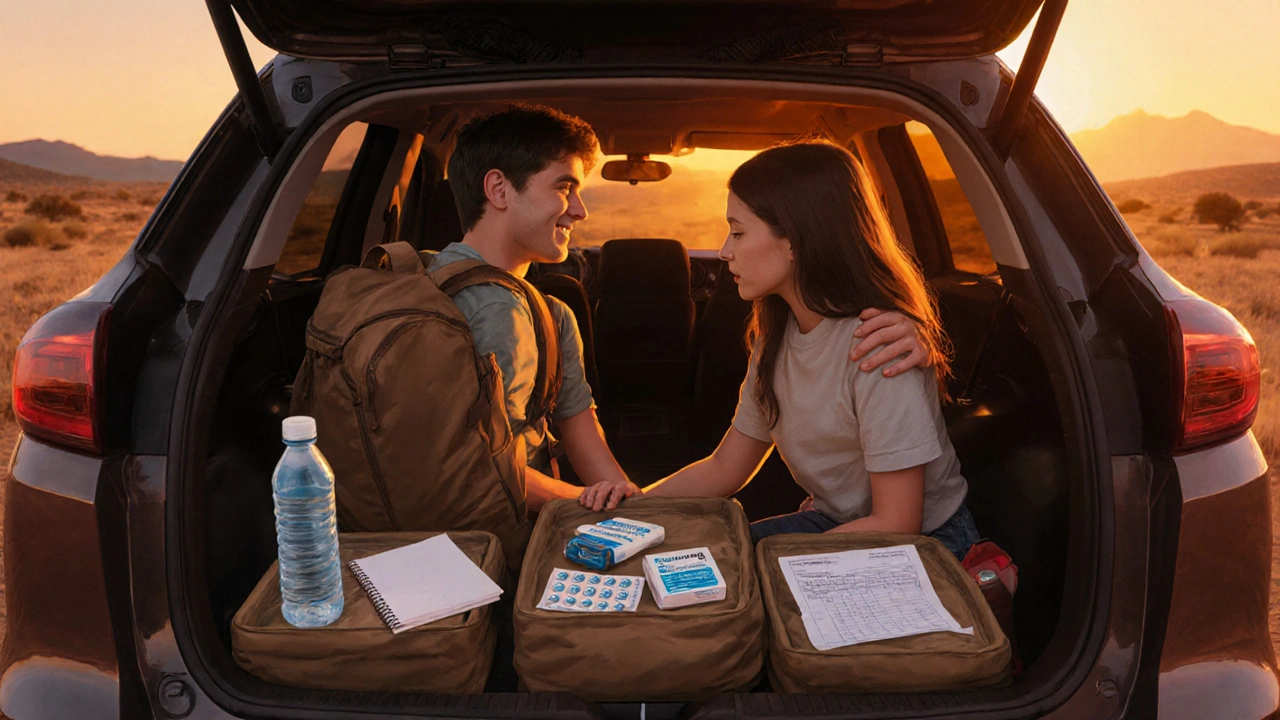CDI Family Support Checklist
Your Progress Summary
Completion Rate: 0%
Tasks Completed: 0 of 7
Next Steps: Focus on completing the remaining tasks to improve your family's CDI management.
- Regular hydration tracking helps prevent dehydration crises.
- Consistent medication adherence is critical for stable hormone levels.
- Emotional support from family reduces stress-related hormone spikes.
Key Takeaways
- Central cranial diabetes insipidus (CDI) is a hormone‑related disorder that requires daily monitoring and medication.
- Family members can boost treatment success by ensuring proper hydration, medication adherence, and emotional stability.
- Clear communication with the medical team and use of support groups reduce the risk of crises.
- A simple checklist helps families stay organized and proactive.
- Common pitfalls include ignoring early warning signs and neglecting routine follow‑ups.
What Is Central Cranial Diabetes Insipidus?
Central Cranial Diabetes Insipidus is a rare condition where the pituitary gland fails to release enough antidiuretic hormone (ADH). Without ADH, the kidneys cannot concentrate urine, leading to excessive urination (polyuria) and extreme thirst (polydipsia). The most common cause is damage to the hypothalamus or pituitary due to trauma, surgery, or tumors.
Patients typically need lifelong therapy with synthetic ADH, most often Desmopressin, and strict fluid‑balance monitoring.
Why family support Is a Game‑Changer
Living with CDI isn’t just a medical issue; it’s a daily lifestyle challenge. Family members who understand the condition can:
- Spot early signs of dehydration before a crisis hits.
- Ensure the patient never misses a dose of Desmopressin.
- Provide emotional reassurance that keeps stress hormones in check, which in turn stabilizes hormone levels.
Studies from the UK National Health Service show that patients with strong family involvement have a 30% lower rate of emergency admissions for severe dehydration.

Practical Ways Families Can Help
1. Master Hydration Management
Hydration is the cornerstone of CDI care. Set up a simple chart that logs fluid intake and urine output each day. Use a marked water bottle (500ml) to make counting easier. If the patient drinks more than 3L in 24hours, flag it to the Medical Team for dose adjustment.
2. Keep Medication on Track
Desmopressin comes in tablets, nasal spray, or sublingual forms. Choose the format that fits the patient’s routine and store it in a visible spot-like the kitchen counter. A weekly pill organizer paired with phone reminders cuts missed doses by half.
3. Monitor Symptoms Closely
Track these three indicators:
- Urine volume (aim for 1-2L per day on stable therapy).
- Thirst level (rating 1‑5 each morning).
- Weight fluctuations (a sudden drop may signal dehydration).
Documenting trends helps the endocrinologist fine‑tune treatment.
4. Provide Emotional Stability
Living with a chronic condition can trigger anxiety or depression. Simple gestures-listening without judgment, encouraging hobbies, or planning low‑stress outings-keep the patient’s mood steady. A calm home environment reduces cortisol spikes that could interfere with hormone balance.
5. Adjust Lifestyle Smartly
Encourage balanced meals rich in electrolytes (potassium, sodium) and limit caffeine, which can increase urine output. When traveling, pack extra Desmopressin and a portable hydration log.
Building a Support Network
Medical Team Collaboration
Regular appointments with an endocrinologist, renal specialist, and a dietitian ensure comprehensive care. Bring the hydration chart to each visit; it serves as concrete data for dose tweaks.
Support Groups and Community Resources
Joining a CDI support group-online or in‑person-connects families with shared experiences. The UK Diabetes Insipidus Society offers quarterly webinars, printable guides, and a peer‑matching service.
A Quick Reference Table
| Support Action | Benefit | How to Implement |
|---|---|---|
| Hydration Log | Early detection of under‑/over‑hydration | Use a daily chart; review each night |
| Medication Reminders | Consistent Desmopressin levels | Phone alarm + pill organizer |
| Emotional Check‑ins | Reduced stress‑related hormone spikes | 15‑minute daily conversation |
| Dietary Oversight | Balanced electrolytes, fewer urine spikes | Plan meals with a dietitian, limit caffeine |
| Support Group Participation | Access to tips, decreased isolation | Attend monthly meetings or online forums |

Common Pitfalls and How to Avoid Them
Missing a dose - Set multiple reminders (phone, fridge magnet) and keep a spare dose in a bag.
Ignoring subtle thirst cues - Teach the patient to rate thirst each morning; a score above 3 signals a check‑in.
Over‑relying on fluids alone - Combine hydration tracking with weight and urine volume for a fuller picture.
Skipping follow‑up appointments - Schedule the next visit before leaving the clinic; mark it on a family calendar.
Family Checklist for CDI Management
- Keep a daily hydration and urine‑output log.
- Set up medication reminders and confirm the dose each morning.
- Review thirst rating and weight every evening.
- Prepare a travel kit: extra Desmopressin, logs, and a copy of the latest lab results.
- Attend at least one support‑group session per month.
- Schedule and attend all specialist appointments.
- Update the medical team on any pattern changes (e.g., increased nocturnal urination).
Frequently Asked Questions
Can children with CDI live a normal life?
Yes. With proper Desmopressin dosing, regular hydration monitoring, and supportive family routines, most children attend school, play sports, and travel without restrictions.
What should I do if my loved one forgets a dose?
First, give the missed dose as soon as remembered, unless it’s within 2hours of the next scheduled dose-then skip the missed one to avoid overdose. Contact the endocrinologist for guidance if you’re unsure.
How often should the Desmopressin dose be reviewed?
Typically every 6‑12months, or sooner if there are changes in weight, fluid intake, or urinary patterns. The medical team may adjust the dose based on blood‑osmolality tests.
Are there dietary restrictions for CDI patients?
No strict bans, but limiting excessive caffeine, alcohol, and high‑salt snacks helps keep urine output stable. A balanced diet with adequate electrolytes supports overall kidney function.
What role does a support group play?
Support groups provide practical tips, emotional camaraderie, and up‑to‑date resources. Families often learn tricks for travel, school planning, and crisis management that aren’t covered in clinical handouts.


Comments
One might argue that the very notion of "family support" is a social construct designed to mask the individual's autonomy. Yet, in the peculiar landscape of central cranial diabetes insipidus, this construct takes on a pragmatic veneer. The logistical choreography of hydration logs, medication timers, and emotional scaffolding creates a safety net that is, paradoxically, both fragile and indispensable. When the pituitary falters, the surrounding kin become the ad hoc endocrinologists of daily life. This dynamic underscores a subtle dialectic: dependence breeds agency, and dependence, when curated, becomes empowerment. So perhaps the true miracle is not the hormone replacement, but the ritualized care that transforms chaos into routine.
Oh great, another checklist – because my life was clearly missing bullet points.
Hey folks, just wanted to add that involving the whole family in the hydration log can actually be a bonding activity. You can turn the daily water intake into a fun challenge, maybe even a friendly competition with small rewards. It keeps everyone engaged and makes the data more reliable because multiple eyes are watching. Also, remember to celebrate tiny victories – like a week of perfect medication adherence. Those celebrations reinforce the habit loop and reduce the feeling of burden. Keep the vibe positive and the routine will stick.
Seriously, if I hear one more person say "just drink more water" I might burst into tears!
We need drama in our lives, but not the drama of a dehydration emergency. Picture this: the family gathered around a glittery water chart, cheering every time the bottle hits the 500 ml mark. The kid feeling like a hero, the parents feeling like rockstars. That's the kind of epic we deserve, not endless trips to the ER. So, dial up the spectacle, because managing CDI can be as thrilling as a season finale if you let it.
Alright, let’s cut the fluff. The checklist is usefull, but you can’t rely on it alone. Families often think ticking boxes = safety, but real safety comes from proper dosage calcualtions and timely labs. If you miss a blood osmolality test, that "checked" item is meaningless. Also, the guide ignores the socioeconomic vars – not every fam has a spare Desmopressin stash. So while the documenation looks pretty, its practical impact is limited unless you address those underlying issues.
Great points above, and I’d like to add a supportive spin. When a family member takes the lead on medication reminders, it can boost confidence for the patient. Celebrate that effort publicly – a simple "thanks for keeping us on track" goes a long way. Also, consider a brief weekly debrief where everyone shares what went well and what could improve. This collaborative reflection builds trust and makes the routine feel less like a chore and more like a team sport. Keep the encouragement flowing, and the habit will become second nature.
From a national health perspective, the emphasis on family involvement is commendable, yet it inadvertently shifts responsibility from the healthcare system onto private citizens. While the checklist is meticulously designed, it assumes uniform access to resources such as specialized pharmacies and reliable internet for tele‑consultations, which is not the case for many regions. Moreover, the language, though ostensibly neutral, subtly reflects a Western bias, overlooking cultural variations in caregiving practices. In sum, the initiative, though well‑intentioned, risks widening disparities unless systemic support is simultaneously fortified.
Quick grammar note: when you refer to "the patient’s" in the checklist, make sure the apostrophe is placed correctly – it’s a possessive, not a contraction. Also, consistency in capitalization (e.g., "Desmopressin" vs "desmopressin") helps maintain professional tone. Small details, but they add up.
With the utmost respect for the esteemed authors of this guide, I must observe that while the procedural recommendations are exhaustive, the tone verges on pedantic. One might question whether the average caregiver, already overwhelmed, can assimilate such a barrage of directives without feeling like they are reading a legal contract. Nevertheless, the inclusion of a travel kit checklist is a laudable touch, demonstrating foresight. In any case, I salute the effort, even if the presentation could benefit from a more compassionate veneer.
The existential weight of chronic disease management cannot be overstated. When families adopt the role of caretakers, they also inherit the silent anxieties that accompany each missed dose or subtle weight shift. It is a quiet burden, often unacknowledged, that can erode the very fabric of familial cohesion. Yet, within this quiet lies the potential for profound resilience – a testament to the human capacity to find meaning in routine. Thus, the checklist serves not merely as a tool but as a ritual, sanctifying daily acts into a collective affirmation of life.
Alright, here’s the 101 on CDI care – first, keep a water log. Second, set an alarm for med time. Third, check weight daily. Fourth, bring extra meds when you travel, duh. Fifth, never skip the doctor appt. Sixth, don’t forget the support group. Seventh, eat balanced meals. Eighth, stay away from too much coffee. Ninth, label your meds. Tenth, keep a backup plan.
I want to extend my heartfelt thanks to everyone sharing their experiences. Knowing that we are not alone in this journey brings immense comfort. The simple act of listening can be a powerful remedy for the emotional strain that accompanies chronic illness. Please remember to take moments for yourself, even if it’s just a quiet breath between tasks. Your well‑being matters as much as the medical schedule. Together, we can turn these challenges into shared victories.
Let’s step back and consider the hidden forces at play here. The push for family-managed checklists isn’t just about care; it’s a subtle way to outsource medical surveillance into the private sphere, reducing the burden on public health systems. One could argue that this is a calculated maneuver, allowing pharmaceutical companies to expand market share under the guise of empowerment. Moreover, the emphasis on hydration tracking aligns conveniently with the rising sales of smart water bottles and health apps, creating a lucrative feedback loop. The “support group” narrative also serves to normalize constant monitoring, turning vigilance into a social norm. Meanwhile, the data collected through these logs could be harvested by third parties, feeding into predictive algorithms that dictate future treatments and pricing structures. Furthermore, the language of the guide subtly frames autonomy as a collective responsibility, which can erode individual agency. By positioning families as the primary custodians of health, the system subtly shifts accountability away from institutional shortcomings. This is not to say that families shouldn’t be involved – on the contrary, their support is invaluable – but the framing suggests a hidden agenda that dovetails with broader neoliberal trends in healthcare. Consider also the geopolitical implications. In regions where government health infrastructure is weak, such checklists become de facto policy, enabling external actors to wield influence through health metrics. The reliance on technology, such as apps for logging, creates a dependency on platforms that are often owned by entities with opaque data policies. All this points to a larger tapestry: a world where health becomes a data point, a marketable commodity, and a tool for soft power. The benign appearance of a family checklist masks an intricate web of economic, political, and social dynamics that deserve our scrutiny.
Great insights above! Just wanted to add a quick tip: keep a spare set of Desmopressin in a zip‑lock bag in your car for emergencies. It’s a simple hack that can prevent a last‑minute scramble if you’re out and about. Also, try setting a recurring calendar event titled "CDI Check‑In" – it nudges you to log fluids and review meds without having to think about it. Small steps like these can make a huge difference.
Everyone’s contributions highlight how essential community support is in managing CDI. By sharing tools, experiences, and practical advice, we build a safety net that goes beyond medical appointments. Let’s continue this collaborative spirit, ensuring that no one feels isolated on their journey.